Leadership and Operations Management in Unilever: Unit 4 Report
VerifiedAdded on 2023/01/06
|15
|4395
|55
Report
AI Summary
This report examines the management and operational strategies of Unilever, a retail organization. It defines and compares the roles of leaders and managers, highlighting their characteristics and responsibilities in various situations, such as brand image improvement, employee recruitment, and turnover management. The report applies leadership theories including situational, systems, and contingency leadership to Unilever's context, illustrating how these theories influence decision-making and operational efficiency. Key approaches to operations management are discussed, along with the roles leaders and managers play in achieving business objectives. Finally, the report assesses the factors within the business environment that impact operational management and decision-making processes. The analysis provides a comprehensive overview of how Unilever's leadership and operational strategies contribute to its overall success.
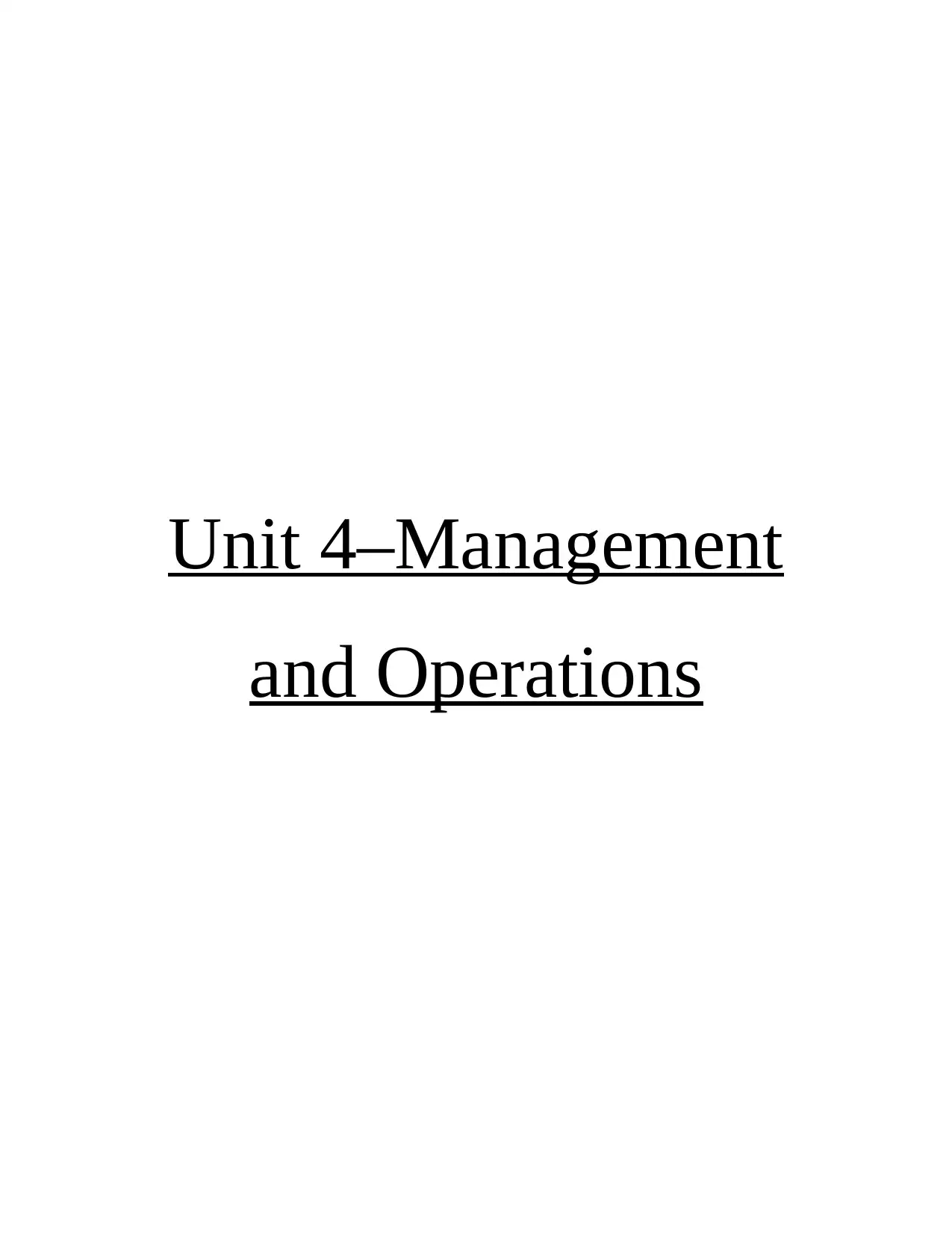
Unit 4–Management
and Operations
and Operations
Paraphrase This Document
Need a fresh take? Get an instant paraphrase of this document with our AI Paraphraser
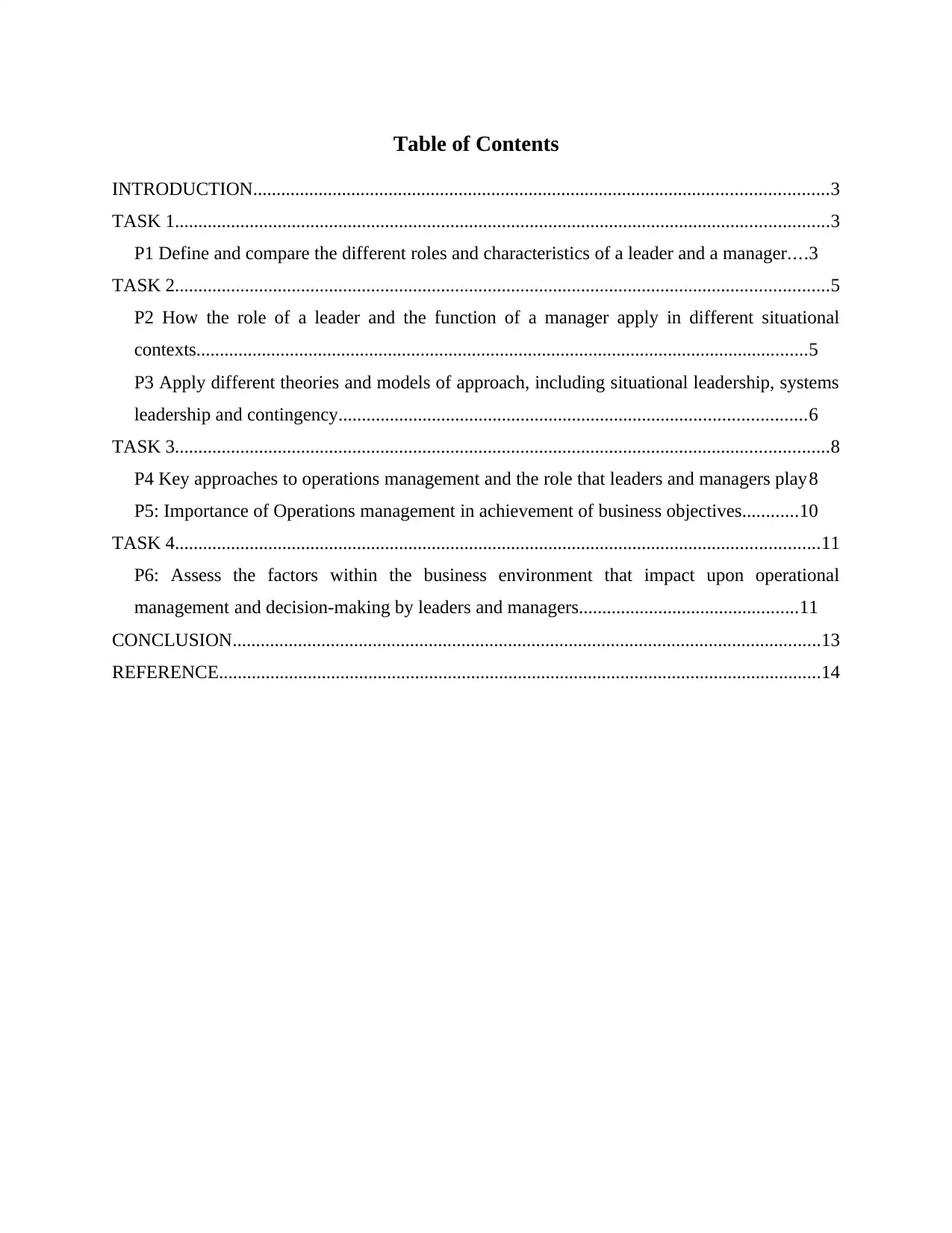
Table of Contents
INTRODUCTION...........................................................................................................................3
TASK 1............................................................................................................................................3
P1 Define and compare the different roles and characteristics of a leader and a manager....3
TASK 2............................................................................................................................................5
P2 How the role of a leader and the function of a manager apply in different situational
contexts...................................................................................................................................5
P3 Apply different theories and models of approach, including situational leadership, systems
leadership and contingency....................................................................................................6
TASK 3............................................................................................................................................8
P4 Key approaches to operations management and the role that leaders and managers play8
P5: Importance of Operations management in achievement of business objectives............10
TASK 4..........................................................................................................................................11
P6: Assess the factors within the business environment that impact upon operational
management and decision-making by leaders and managers...............................................11
CONCLUSION..............................................................................................................................13
REFERENCE.................................................................................................................................14
INTRODUCTION...........................................................................................................................3
TASK 1............................................................................................................................................3
P1 Define and compare the different roles and characteristics of a leader and a manager....3
TASK 2............................................................................................................................................5
P2 How the role of a leader and the function of a manager apply in different situational
contexts...................................................................................................................................5
P3 Apply different theories and models of approach, including situational leadership, systems
leadership and contingency....................................................................................................6
TASK 3............................................................................................................................................8
P4 Key approaches to operations management and the role that leaders and managers play8
P5: Importance of Operations management in achievement of business objectives............10
TASK 4..........................................................................................................................................11
P6: Assess the factors within the business environment that impact upon operational
management and decision-making by leaders and managers...............................................11
CONCLUSION..............................................................................................................................13
REFERENCE.................................................................................................................................14
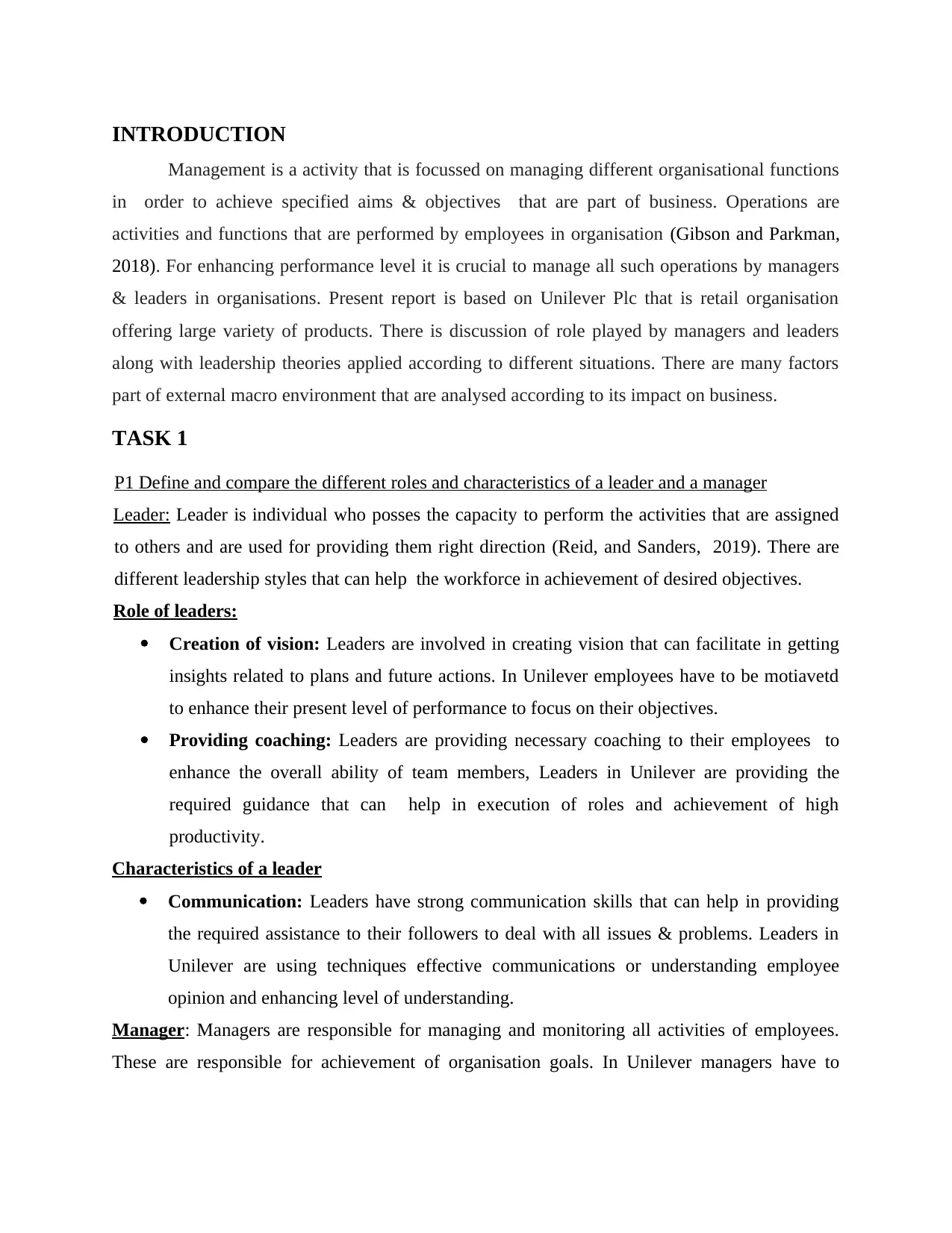
INTRODUCTION
Management is a activity that is focussed on managing different organisational functions
in order to achieve specified aims & objectives that are part of business. Operations are
activities and functions that are performed by employees in organisation (Gibson and Parkman,
2018). For enhancing performance level it is crucial to manage all such operations by managers
& leaders in organisations. Present report is based on Unilever Plc that is retail organisation
offering large variety of products. There is discussion of role played by managers and leaders
along with leadership theories applied according to different situations. There are many factors
part of external macro environment that are analysed according to its impact on business.
TASK 1
P1 Define and compare the different roles and characteristics of a leader and a manager
Leader: Leader is individual who posses the capacity to perform the activities that are assigned
to others and are used for providing them right direction (Reid, and Sanders, 2019). There are
different leadership styles that can help the workforce in achievement of desired objectives.
Role of leaders:
Creation of vision: Leaders are involved in creating vision that can facilitate in getting
insights related to plans and future actions. In Unilever employees have to be motiavetd
to enhance their present level of performance to focus on their objectives.
Providing coaching: Leaders are providing necessary coaching to their employees to
enhance the overall ability of team members, Leaders in Unilever are providing the
required guidance that can help in execution of roles and achievement of high
productivity.
Characteristics of a leader
Communication: Leaders have strong communication skills that can help in providing
the required assistance to their followers to deal with all issues & problems. Leaders in
Unilever are using techniques effective communications or understanding employee
opinion and enhancing level of understanding.
Manager: Managers are responsible for managing and monitoring all activities of employees.
These are responsible for achievement of organisation goals. In Unilever managers have to
Management is a activity that is focussed on managing different organisational functions
in order to achieve specified aims & objectives that are part of business. Operations are
activities and functions that are performed by employees in organisation (Gibson and Parkman,
2018). For enhancing performance level it is crucial to manage all such operations by managers
& leaders in organisations. Present report is based on Unilever Plc that is retail organisation
offering large variety of products. There is discussion of role played by managers and leaders
along with leadership theories applied according to different situations. There are many factors
part of external macro environment that are analysed according to its impact on business.
TASK 1
P1 Define and compare the different roles and characteristics of a leader and a manager
Leader: Leader is individual who posses the capacity to perform the activities that are assigned
to others and are used for providing them right direction (Reid, and Sanders, 2019). There are
different leadership styles that can help the workforce in achievement of desired objectives.
Role of leaders:
Creation of vision: Leaders are involved in creating vision that can facilitate in getting
insights related to plans and future actions. In Unilever employees have to be motiavetd
to enhance their present level of performance to focus on their objectives.
Providing coaching: Leaders are providing necessary coaching to their employees to
enhance the overall ability of team members, Leaders in Unilever are providing the
required guidance that can help in execution of roles and achievement of high
productivity.
Characteristics of a leader
Communication: Leaders have strong communication skills that can help in providing
the required assistance to their followers to deal with all issues & problems. Leaders in
Unilever are using techniques effective communications or understanding employee
opinion and enhancing level of understanding.
Manager: Managers are responsible for managing and monitoring all activities of employees.
These are responsible for achievement of organisation goals. In Unilever managers have to
⊘ This is a preview!⊘
Do you want full access?
Subscribe today to unlock all pages.

Trusted by 1+ million students worldwide
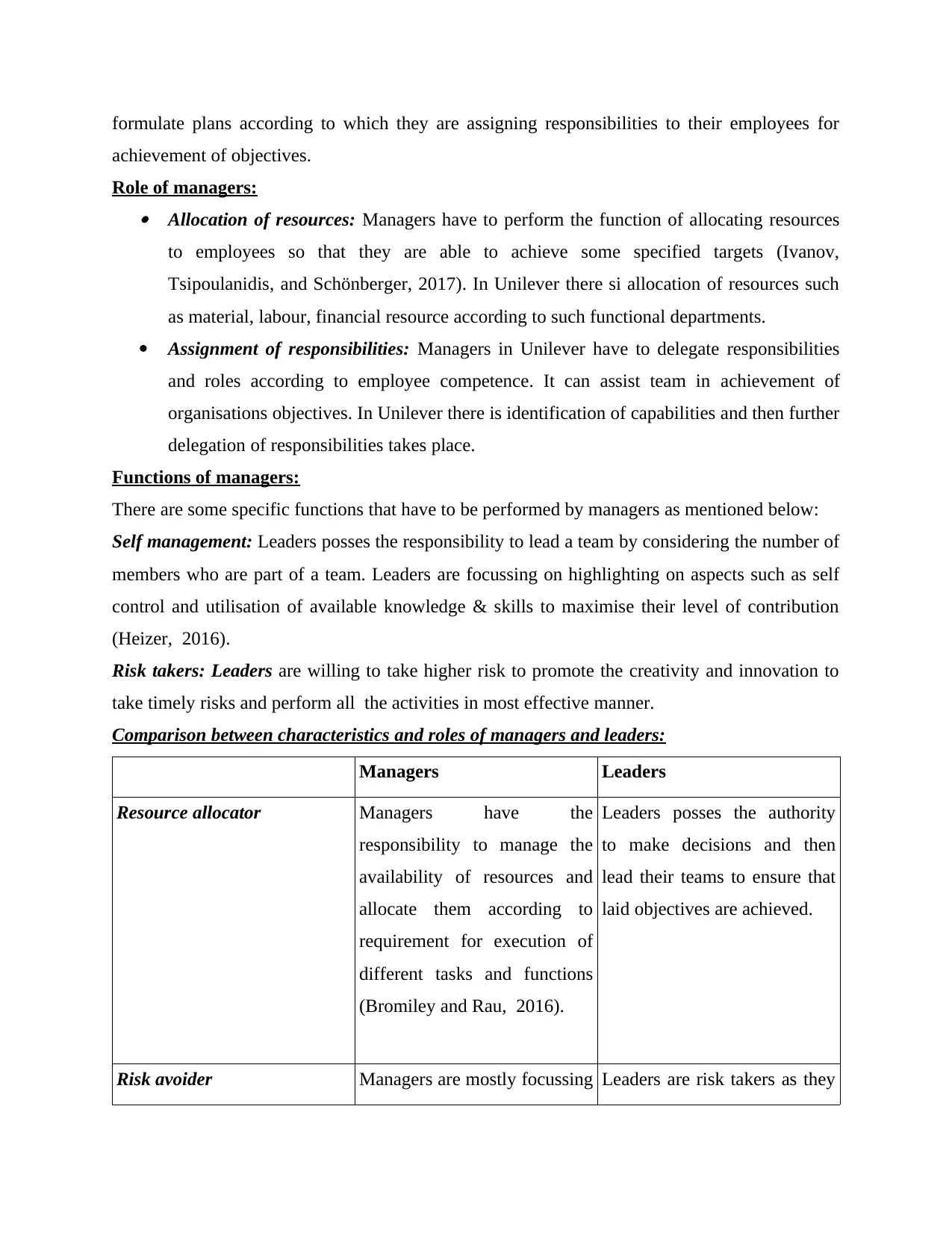
formulate plans according to which they are assigning responsibilities to their employees for
achievement of objectives.
Role of managers: Allocation of resources: Managers have to perform the function of allocating resources
to employees so that they are able to achieve some specified targets (Ivanov,
Tsipoulanidis, and Schönberger, 2017). In Unilever there si allocation of resources such
as material, labour, financial resource according to such functional departments.
Assignment of responsibilities: Managers in Unilever have to delegate responsibilities
and roles according to employee competence. It can assist team in achievement of
organisations objectives. In Unilever there is identification of capabilities and then further
delegation of responsibilities takes place.
Functions of managers:
There are some specific functions that have to be performed by managers as mentioned below:
Self management: Leaders posses the responsibility to lead a team by considering the number of
members who are part of a team. Leaders are focussing on highlighting on aspects such as self
control and utilisation of available knowledge & skills to maximise their level of contribution
(Heizer, 2016).
Risk takers: Leaders are willing to take higher risk to promote the creativity and innovation to
take timely risks and perform all the activities in most effective manner.
Comparison between characteristics and roles of managers and leaders:
Managers Leaders
Resource allocator Managers have the
responsibility to manage the
availability of resources and
allocate them according to
requirement for execution of
different tasks and functions
(Bromiley and Rau, 2016).
Leaders posses the authority
to make decisions and then
lead their teams to ensure that
laid objectives are achieved.
Risk avoider Managers are mostly focussing Leaders are risk takers as they
achievement of objectives.
Role of managers: Allocation of resources: Managers have to perform the function of allocating resources
to employees so that they are able to achieve some specified targets (Ivanov,
Tsipoulanidis, and Schönberger, 2017). In Unilever there si allocation of resources such
as material, labour, financial resource according to such functional departments.
Assignment of responsibilities: Managers in Unilever have to delegate responsibilities
and roles according to employee competence. It can assist team in achievement of
organisations objectives. In Unilever there is identification of capabilities and then further
delegation of responsibilities takes place.
Functions of managers:
There are some specific functions that have to be performed by managers as mentioned below:
Self management: Leaders posses the responsibility to lead a team by considering the number of
members who are part of a team. Leaders are focussing on highlighting on aspects such as self
control and utilisation of available knowledge & skills to maximise their level of contribution
(Heizer, 2016).
Risk takers: Leaders are willing to take higher risk to promote the creativity and innovation to
take timely risks and perform all the activities in most effective manner.
Comparison between characteristics and roles of managers and leaders:
Managers Leaders
Resource allocator Managers have the
responsibility to manage the
availability of resources and
allocate them according to
requirement for execution of
different tasks and functions
(Bromiley and Rau, 2016).
Leaders posses the authority
to make decisions and then
lead their teams to ensure that
laid objectives are achieved.
Risk avoider Managers are mostly focussing Leaders are risk takers as they
Paraphrase This Document
Need a fresh take? Get an instant paraphrase of this document with our AI Paraphraser
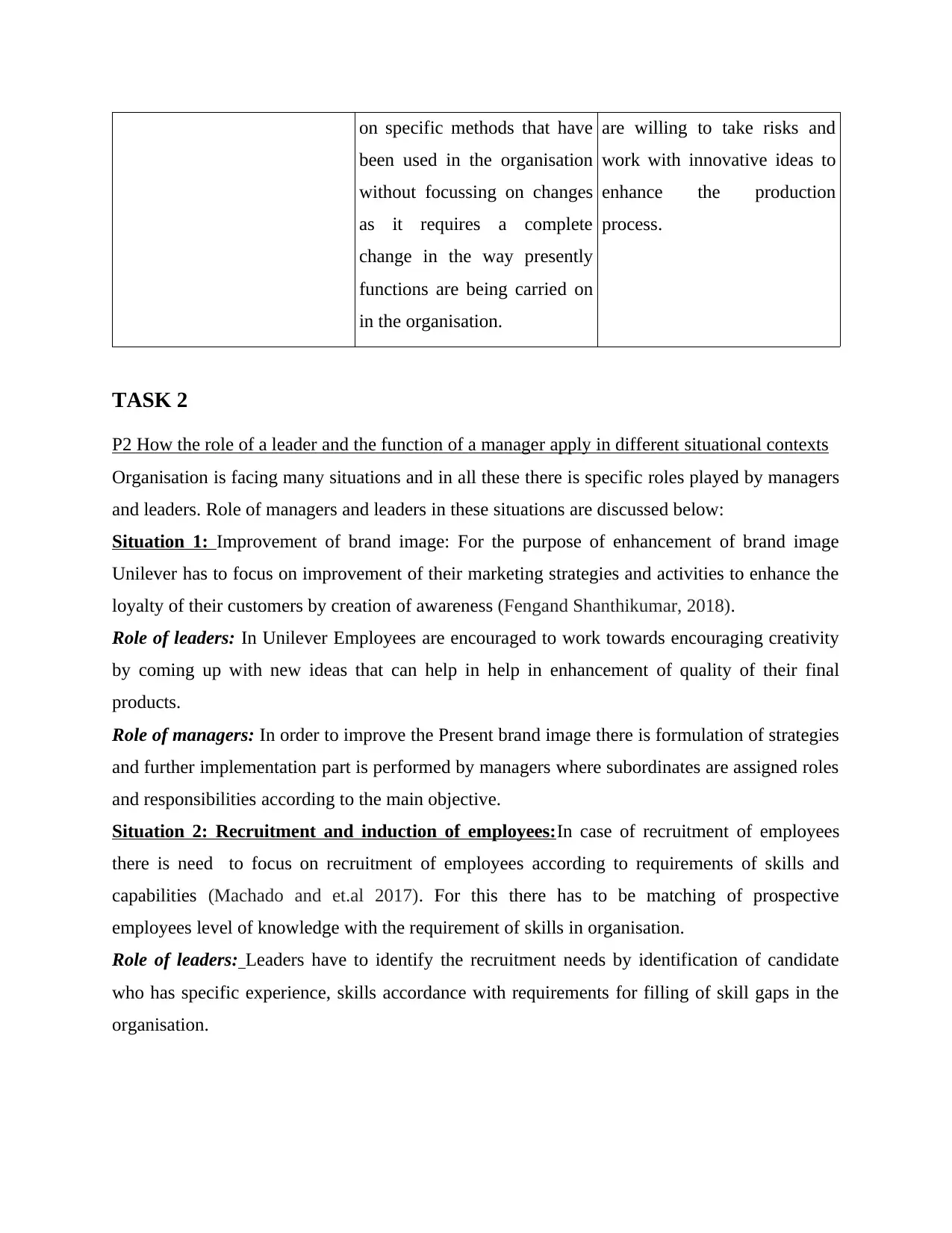
on specific methods that have
been used in the organisation
without focussing on changes
as it requires a complete
change in the way presently
functions are being carried on
in the organisation.
are willing to take risks and
work with innovative ideas to
enhance the production
process.
TASK 2
P2 How the role of a leader and the function of a manager apply in different situational contexts
Organisation is facing many situations and in all these there is specific roles played by managers
and leaders. Role of managers and leaders in these situations are discussed below:
Situation 1: Improvement of brand image: For the purpose of enhancement of brand image
Unilever has to focus on improvement of their marketing strategies and activities to enhance the
loyalty of their customers by creation of awareness (Fengand Shanthikumar, 2018).
Role of leaders: In Unilever Employees are encouraged to work towards encouraging creativity
by coming up with new ideas that can help in help in enhancement of quality of their final
products.
Role of managers: In order to improve the Present brand image there is formulation of strategies
and further implementation part is performed by managers where subordinates are assigned roles
and responsibilities according to the main objective.
Situation 2: Recruitment and induction of employees:In case of recruitment of employees
there is need to focus on recruitment of employees according to requirements of skills and
capabilities (Machado and et.al 2017). For this there has to be matching of prospective
employees level of knowledge with the requirement of skills in organisation.
Role of leaders: Leaders have to identify the recruitment needs by identification of candidate
who has specific experience, skills accordance with requirements for filling of skill gaps in the
organisation.
been used in the organisation
without focussing on changes
as it requires a complete
change in the way presently
functions are being carried on
in the organisation.
are willing to take risks and
work with innovative ideas to
enhance the production
process.
TASK 2
P2 How the role of a leader and the function of a manager apply in different situational contexts
Organisation is facing many situations and in all these there is specific roles played by managers
and leaders. Role of managers and leaders in these situations are discussed below:
Situation 1: Improvement of brand image: For the purpose of enhancement of brand image
Unilever has to focus on improvement of their marketing strategies and activities to enhance the
loyalty of their customers by creation of awareness (Fengand Shanthikumar, 2018).
Role of leaders: In Unilever Employees are encouraged to work towards encouraging creativity
by coming up with new ideas that can help in help in enhancement of quality of their final
products.
Role of managers: In order to improve the Present brand image there is formulation of strategies
and further implementation part is performed by managers where subordinates are assigned roles
and responsibilities according to the main objective.
Situation 2: Recruitment and induction of employees:In case of recruitment of employees
there is need to focus on recruitment of employees according to requirements of skills and
capabilities (Machado and et.al 2017). For this there has to be matching of prospective
employees level of knowledge with the requirement of skills in organisation.
Role of leaders: Leaders have to identify the recruitment needs by identification of candidate
who has specific experience, skills accordance with requirements for filling of skill gaps in the
organisation.
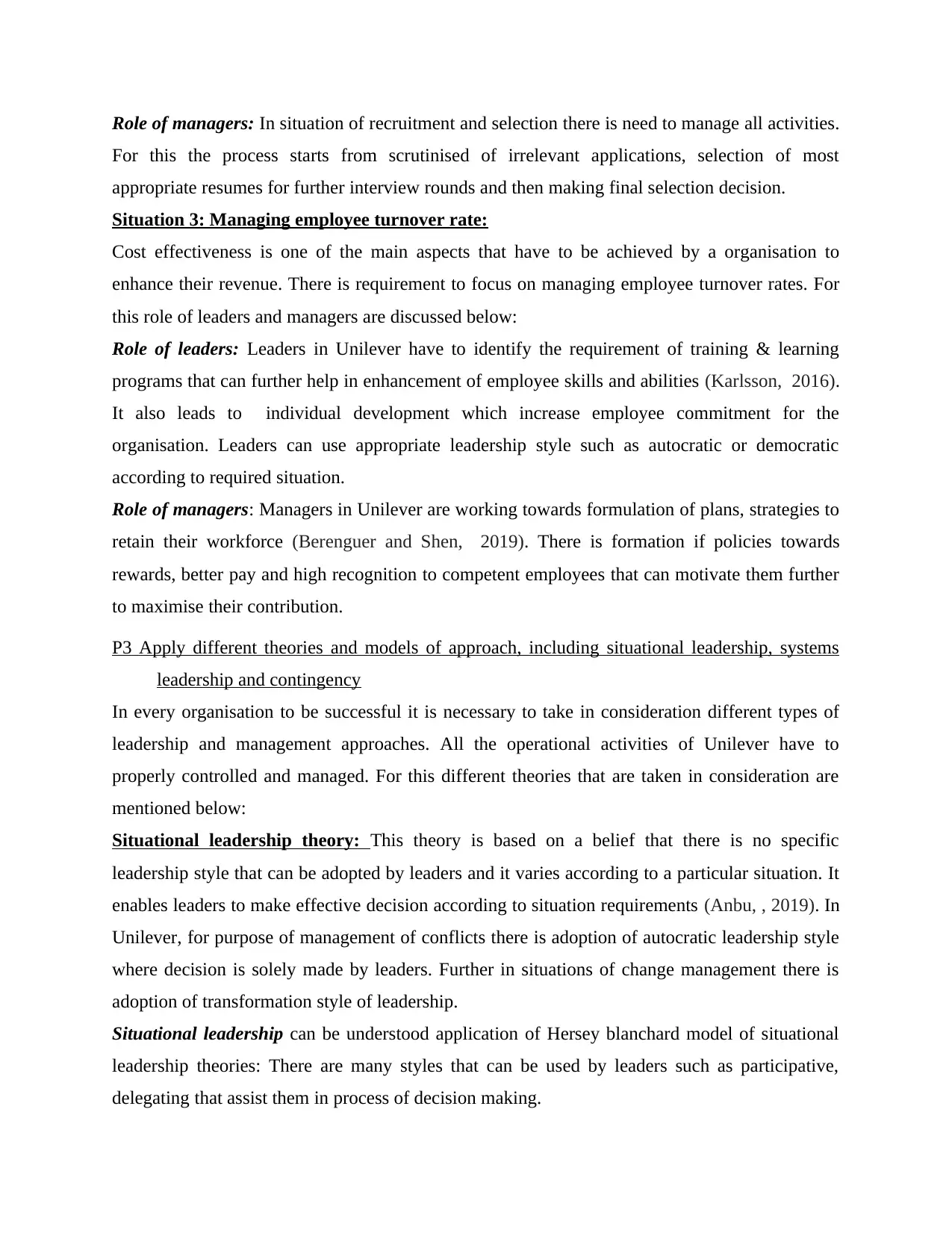
Role of managers: In situation of recruitment and selection there is need to manage all activities.
For this the process starts from scrutinised of irrelevant applications, selection of most
appropriate resumes for further interview rounds and then making final selection decision.
Situation 3: Managing employee turnover rate:
Cost effectiveness is one of the main aspects that have to be achieved by a organisation to
enhance their revenue. There is requirement to focus on managing employee turnover rates. For
this role of leaders and managers are discussed below:
Role of leaders: Leaders in Unilever have to identify the requirement of training & learning
programs that can further help in enhancement of employee skills and abilities (Karlsson, 2016).
It also leads to individual development which increase employee commitment for the
organisation. Leaders can use appropriate leadership style such as autocratic or democratic
according to required situation.
Role of managers: Managers in Unilever are working towards formulation of plans, strategies to
retain their workforce (Berenguer and Shen, 2019). There is formation if policies towards
rewards, better pay and high recognition to competent employees that can motivate them further
to maximise their contribution.
P3 Apply different theories and models of approach, including situational leadership, systems
leadership and contingency
In every organisation to be successful it is necessary to take in consideration different types of
leadership and management approaches. All the operational activities of Unilever have to
properly controlled and managed. For this different theories that are taken in consideration are
mentioned below:
Situational leadership theory: This theory is based on a belief that there is no specific
leadership style that can be adopted by leaders and it varies according to a particular situation. It
enables leaders to make effective decision according to situation requirements (Anbu, , 2019). In
Unilever, for purpose of management of conflicts there is adoption of autocratic leadership style
where decision is solely made by leaders. Further in situations of change management there is
adoption of transformation style of leadership.
Situational leadership can be understood application of Hersey blanchard model of situational
leadership theories: There are many styles that can be used by leaders such as participative,
delegating that assist them in process of decision making.
For this the process starts from scrutinised of irrelevant applications, selection of most
appropriate resumes for further interview rounds and then making final selection decision.
Situation 3: Managing employee turnover rate:
Cost effectiveness is one of the main aspects that have to be achieved by a organisation to
enhance their revenue. There is requirement to focus on managing employee turnover rates. For
this role of leaders and managers are discussed below:
Role of leaders: Leaders in Unilever have to identify the requirement of training & learning
programs that can further help in enhancement of employee skills and abilities (Karlsson, 2016).
It also leads to individual development which increase employee commitment for the
organisation. Leaders can use appropriate leadership style such as autocratic or democratic
according to required situation.
Role of managers: Managers in Unilever are working towards formulation of plans, strategies to
retain their workforce (Berenguer and Shen, 2019). There is formation if policies towards
rewards, better pay and high recognition to competent employees that can motivate them further
to maximise their contribution.
P3 Apply different theories and models of approach, including situational leadership, systems
leadership and contingency
In every organisation to be successful it is necessary to take in consideration different types of
leadership and management approaches. All the operational activities of Unilever have to
properly controlled and managed. For this different theories that are taken in consideration are
mentioned below:
Situational leadership theory: This theory is based on a belief that there is no specific
leadership style that can be adopted by leaders and it varies according to a particular situation. It
enables leaders to make effective decision according to situation requirements (Anbu, , 2019). In
Unilever, for purpose of management of conflicts there is adoption of autocratic leadership style
where decision is solely made by leaders. Further in situations of change management there is
adoption of transformation style of leadership.
Situational leadership can be understood application of Hersey blanchard model of situational
leadership theories: There are many styles that can be used by leaders such as participative,
delegating that assist them in process of decision making.
⊘ This is a preview!⊘
Do you want full access?
Subscribe today to unlock all pages.

Trusted by 1+ million students worldwide
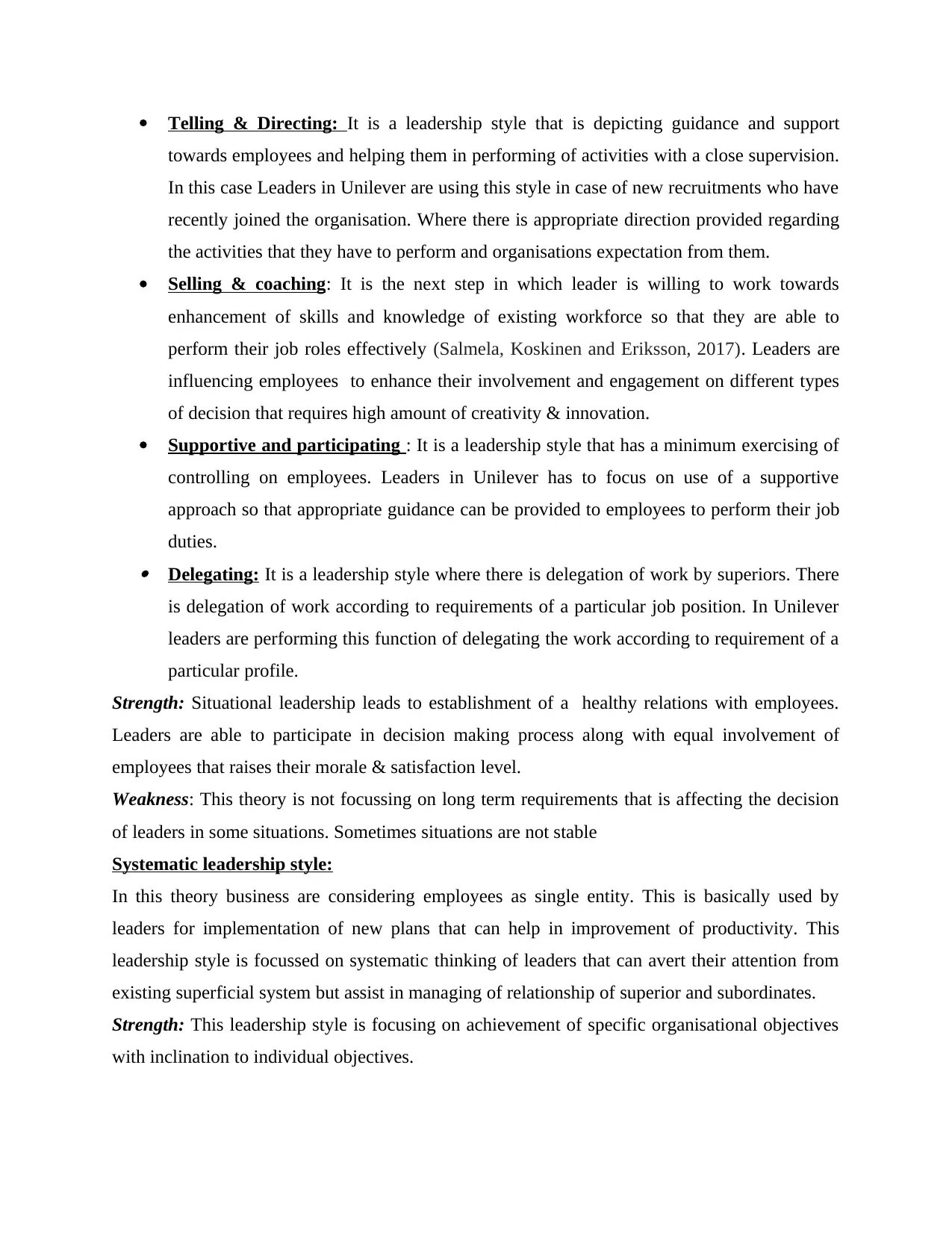
Telling & Directing: It is a leadership style that is depicting guidance and support
towards employees and helping them in performing of activities with a close supervision.
In this case Leaders in Unilever are using this style in case of new recruitments who have
recently joined the organisation. Where there is appropriate direction provided regarding
the activities that they have to perform and organisations expectation from them.
Selling & coaching: It is the next step in which leader is willing to work towards
enhancement of skills and knowledge of existing workforce so that they are able to
perform their job roles effectively (Salmela, Koskinen and Eriksson, 2017). Leaders are
influencing employees to enhance their involvement and engagement on different types
of decision that requires high amount of creativity & innovation.
Supportive and participating : It is a leadership style that has a minimum exercising of
controlling on employees. Leaders in Unilever has to focus on use of a supportive
approach so that appropriate guidance can be provided to employees to perform their job
duties. Delegating: It is a leadership style where there is delegation of work by superiors. There
is delegation of work according to requirements of a particular job position. In Unilever
leaders are performing this function of delegating the work according to requirement of a
particular profile.
Strength: Situational leadership leads to establishment of a healthy relations with employees.
Leaders are able to participate in decision making process along with equal involvement of
employees that raises their morale & satisfaction level.
Weakness: This theory is not focussing on long term requirements that is affecting the decision
of leaders in some situations. Sometimes situations are not stable
Systematic leadership style:
In this theory business are considering employees as single entity. This is basically used by
leaders for implementation of new plans that can help in improvement of productivity. This
leadership style is focussed on systematic thinking of leaders that can avert their attention from
existing superficial system but assist in managing of relationship of superior and subordinates.
Strength: This leadership style is focusing on achievement of specific organisational objectives
with inclination to individual objectives.
towards employees and helping them in performing of activities with a close supervision.
In this case Leaders in Unilever are using this style in case of new recruitments who have
recently joined the organisation. Where there is appropriate direction provided regarding
the activities that they have to perform and organisations expectation from them.
Selling & coaching: It is the next step in which leader is willing to work towards
enhancement of skills and knowledge of existing workforce so that they are able to
perform their job roles effectively (Salmela, Koskinen and Eriksson, 2017). Leaders are
influencing employees to enhance their involvement and engagement on different types
of decision that requires high amount of creativity & innovation.
Supportive and participating : It is a leadership style that has a minimum exercising of
controlling on employees. Leaders in Unilever has to focus on use of a supportive
approach so that appropriate guidance can be provided to employees to perform their job
duties. Delegating: It is a leadership style where there is delegation of work by superiors. There
is delegation of work according to requirements of a particular job position. In Unilever
leaders are performing this function of delegating the work according to requirement of a
particular profile.
Strength: Situational leadership leads to establishment of a healthy relations with employees.
Leaders are able to participate in decision making process along with equal involvement of
employees that raises their morale & satisfaction level.
Weakness: This theory is not focussing on long term requirements that is affecting the decision
of leaders in some situations. Sometimes situations are not stable
Systematic leadership style:
In this theory business are considering employees as single entity. This is basically used by
leaders for implementation of new plans that can help in improvement of productivity. This
leadership style is focussed on systematic thinking of leaders that can avert their attention from
existing superficial system but assist in managing of relationship of superior and subordinates.
Strength: This leadership style is focusing on achievement of specific organisational objectives
with inclination to individual objectives.
Paraphrase This Document
Need a fresh take? Get an instant paraphrase of this document with our AI Paraphraser
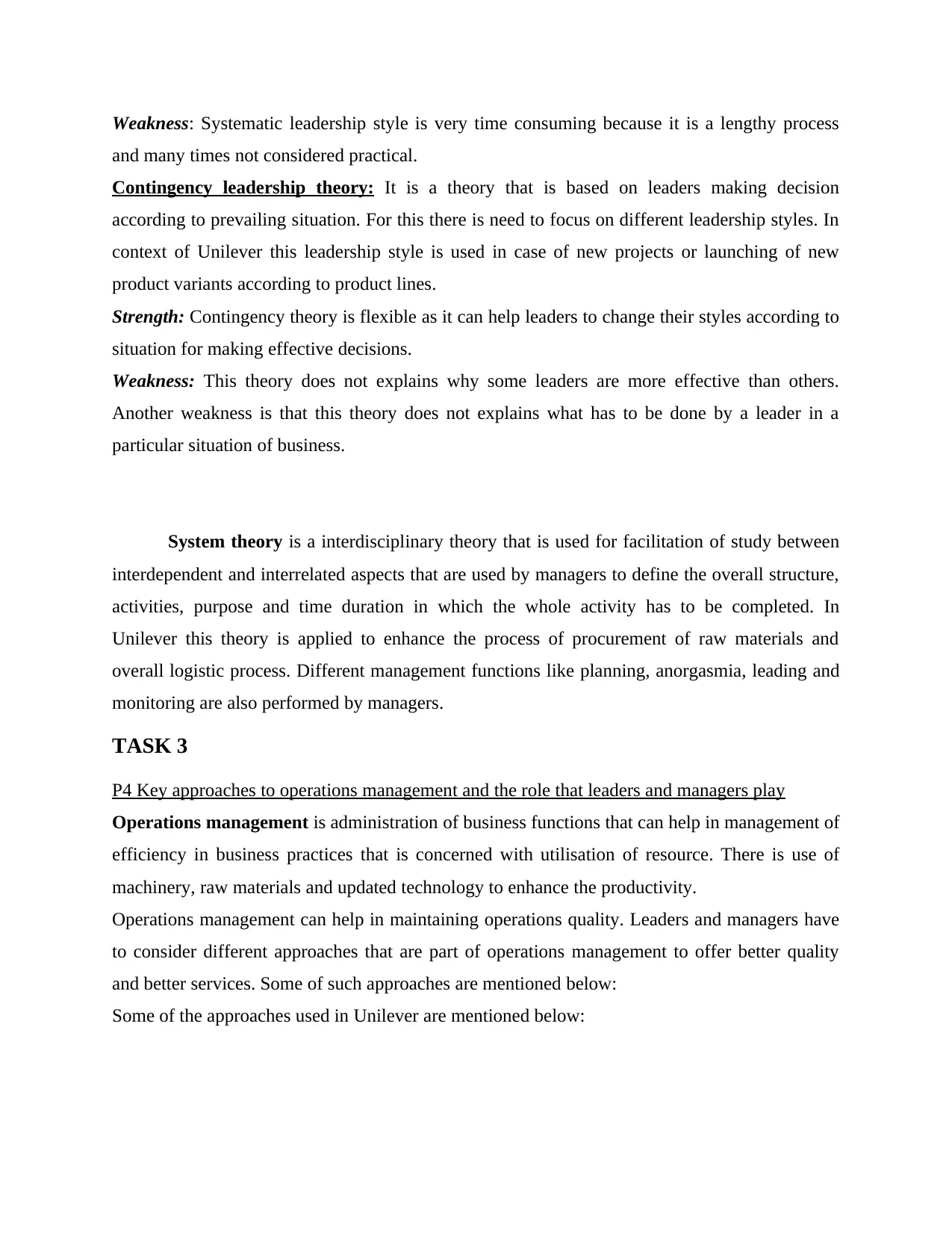
Weakness: Systematic leadership style is very time consuming because it is a lengthy process
and many times not considered practical.
Contingency leadership theory: It is a theory that is based on leaders making decision
according to prevailing situation. For this there is need to focus on different leadership styles. In
context of Unilever this leadership style is used in case of new projects or launching of new
product variants according to product lines.
Strength: Contingency theory is flexible as it can help leaders to change their styles according to
situation for making effective decisions.
Weakness: This theory does not explains why some leaders are more effective than others.
Another weakness is that this theory does not explains what has to be done by a leader in a
particular situation of business.
System theory is a interdisciplinary theory that is used for facilitation of study between
interdependent and interrelated aspects that are used by managers to define the overall structure,
activities, purpose and time duration in which the whole activity has to be completed. In
Unilever this theory is applied to enhance the process of procurement of raw materials and
overall logistic process. Different management functions like planning, anorgasmia, leading and
monitoring are also performed by managers.
TASK 3
P4 Key approaches to operations management and the role that leaders and managers play
Operations management is administration of business functions that can help in management of
efficiency in business practices that is concerned with utilisation of resource. There is use of
machinery, raw materials and updated technology to enhance the productivity.
Operations management can help in maintaining operations quality. Leaders and managers have
to consider different approaches that are part of operations management to offer better quality
and better services. Some of such approaches are mentioned below:
Some of the approaches used in Unilever are mentioned below:
and many times not considered practical.
Contingency leadership theory: It is a theory that is based on leaders making decision
according to prevailing situation. For this there is need to focus on different leadership styles. In
context of Unilever this leadership style is used in case of new projects or launching of new
product variants according to product lines.
Strength: Contingency theory is flexible as it can help leaders to change their styles according to
situation for making effective decisions.
Weakness: This theory does not explains why some leaders are more effective than others.
Another weakness is that this theory does not explains what has to be done by a leader in a
particular situation of business.
System theory is a interdisciplinary theory that is used for facilitation of study between
interdependent and interrelated aspects that are used by managers to define the overall structure,
activities, purpose and time duration in which the whole activity has to be completed. In
Unilever this theory is applied to enhance the process of procurement of raw materials and
overall logistic process. Different management functions like planning, anorgasmia, leading and
monitoring are also performed by managers.
TASK 3
P4 Key approaches to operations management and the role that leaders and managers play
Operations management is administration of business functions that can help in management of
efficiency in business practices that is concerned with utilisation of resource. There is use of
machinery, raw materials and updated technology to enhance the productivity.
Operations management can help in maintaining operations quality. Leaders and managers have
to consider different approaches that are part of operations management to offer better quality
and better services. Some of such approaches are mentioned below:
Some of the approaches used in Unilever are mentioned below:
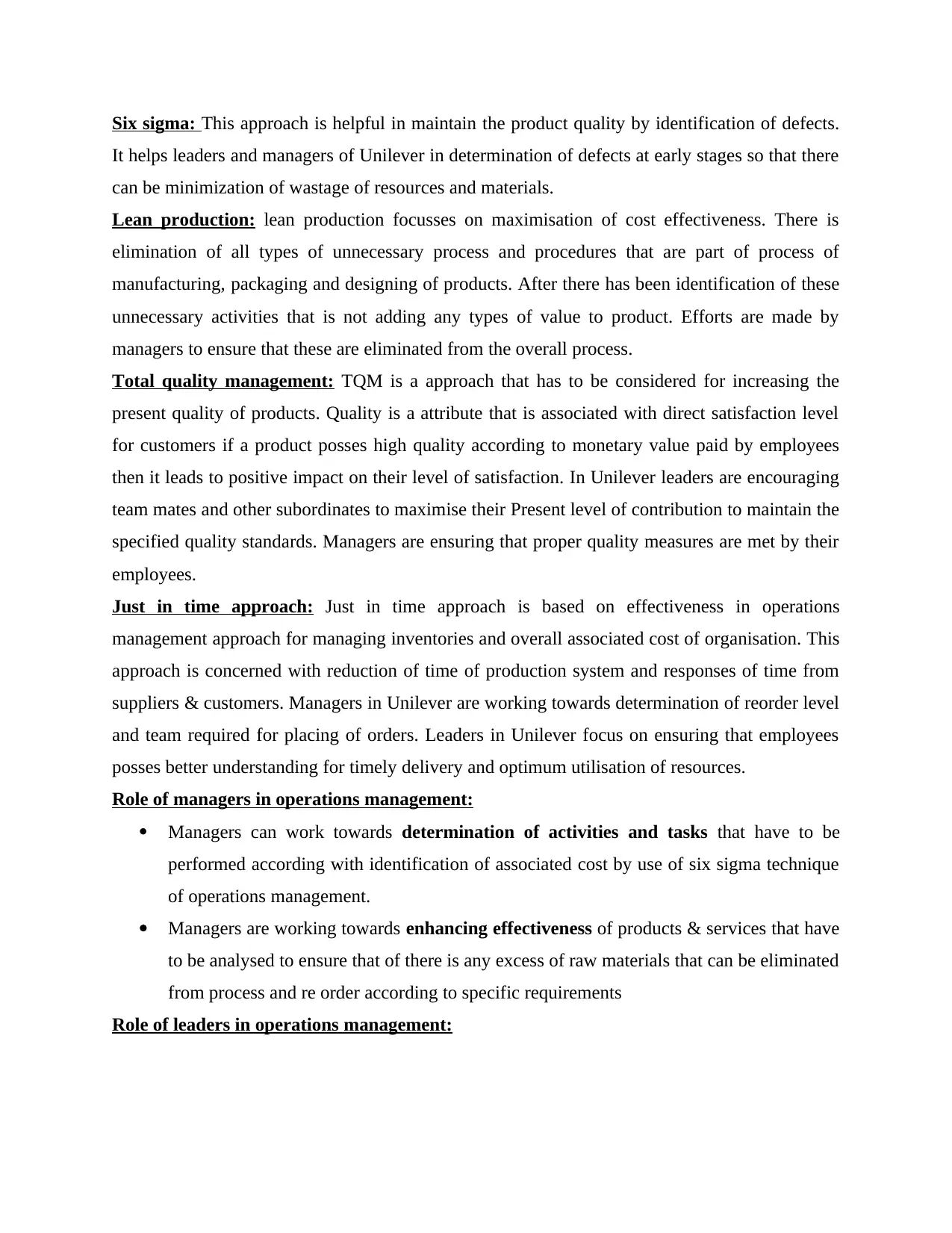
Six sigma: This approach is helpful in maintain the product quality by identification of defects.
It helps leaders and managers of Unilever in determination of defects at early stages so that there
can be minimization of wastage of resources and materials.
Lean production: lean production focusses on maximisation of cost effectiveness. There is
elimination of all types of unnecessary process and procedures that are part of process of
manufacturing, packaging and designing of products. After there has been identification of these
unnecessary activities that is not adding any types of value to product. Efforts are made by
managers to ensure that these are eliminated from the overall process.
Total quality management: TQM is a approach that has to be considered for increasing the
present quality of products. Quality is a attribute that is associated with direct satisfaction level
for customers if a product posses high quality according to monetary value paid by employees
then it leads to positive impact on their level of satisfaction. In Unilever leaders are encouraging
team mates and other subordinates to maximise their Present level of contribution to maintain the
specified quality standards. Managers are ensuring that proper quality measures are met by their
employees.
Just in time approach: Just in time approach is based on effectiveness in operations
management approach for managing inventories and overall associated cost of organisation. This
approach is concerned with reduction of time of production system and responses of time from
suppliers & customers. Managers in Unilever are working towards determination of reorder level
and team required for placing of orders. Leaders in Unilever focus on ensuring that employees
posses better understanding for timely delivery and optimum utilisation of resources.
Role of managers in operations management:
Managers can work towards determination of activities and tasks that have to be
performed according with identification of associated cost by use of six sigma technique
of operations management.
Managers are working towards enhancing effectiveness of products & services that have
to be analysed to ensure that of there is any excess of raw materials that can be eliminated
from process and re order according to specific requirements
Role of leaders in operations management:
It helps leaders and managers of Unilever in determination of defects at early stages so that there
can be minimization of wastage of resources and materials.
Lean production: lean production focusses on maximisation of cost effectiveness. There is
elimination of all types of unnecessary process and procedures that are part of process of
manufacturing, packaging and designing of products. After there has been identification of these
unnecessary activities that is not adding any types of value to product. Efforts are made by
managers to ensure that these are eliminated from the overall process.
Total quality management: TQM is a approach that has to be considered for increasing the
present quality of products. Quality is a attribute that is associated with direct satisfaction level
for customers if a product posses high quality according to monetary value paid by employees
then it leads to positive impact on their level of satisfaction. In Unilever leaders are encouraging
team mates and other subordinates to maximise their Present level of contribution to maintain the
specified quality standards. Managers are ensuring that proper quality measures are met by their
employees.
Just in time approach: Just in time approach is based on effectiveness in operations
management approach for managing inventories and overall associated cost of organisation. This
approach is concerned with reduction of time of production system and responses of time from
suppliers & customers. Managers in Unilever are working towards determination of reorder level
and team required for placing of orders. Leaders in Unilever focus on ensuring that employees
posses better understanding for timely delivery and optimum utilisation of resources.
Role of managers in operations management:
Managers can work towards determination of activities and tasks that have to be
performed according with identification of associated cost by use of six sigma technique
of operations management.
Managers are working towards enhancing effectiveness of products & services that have
to be analysed to ensure that of there is any excess of raw materials that can be eliminated
from process and re order according to specific requirements
Role of leaders in operations management:
⊘ This is a preview!⊘
Do you want full access?
Subscribe today to unlock all pages.

Trusted by 1+ million students worldwide
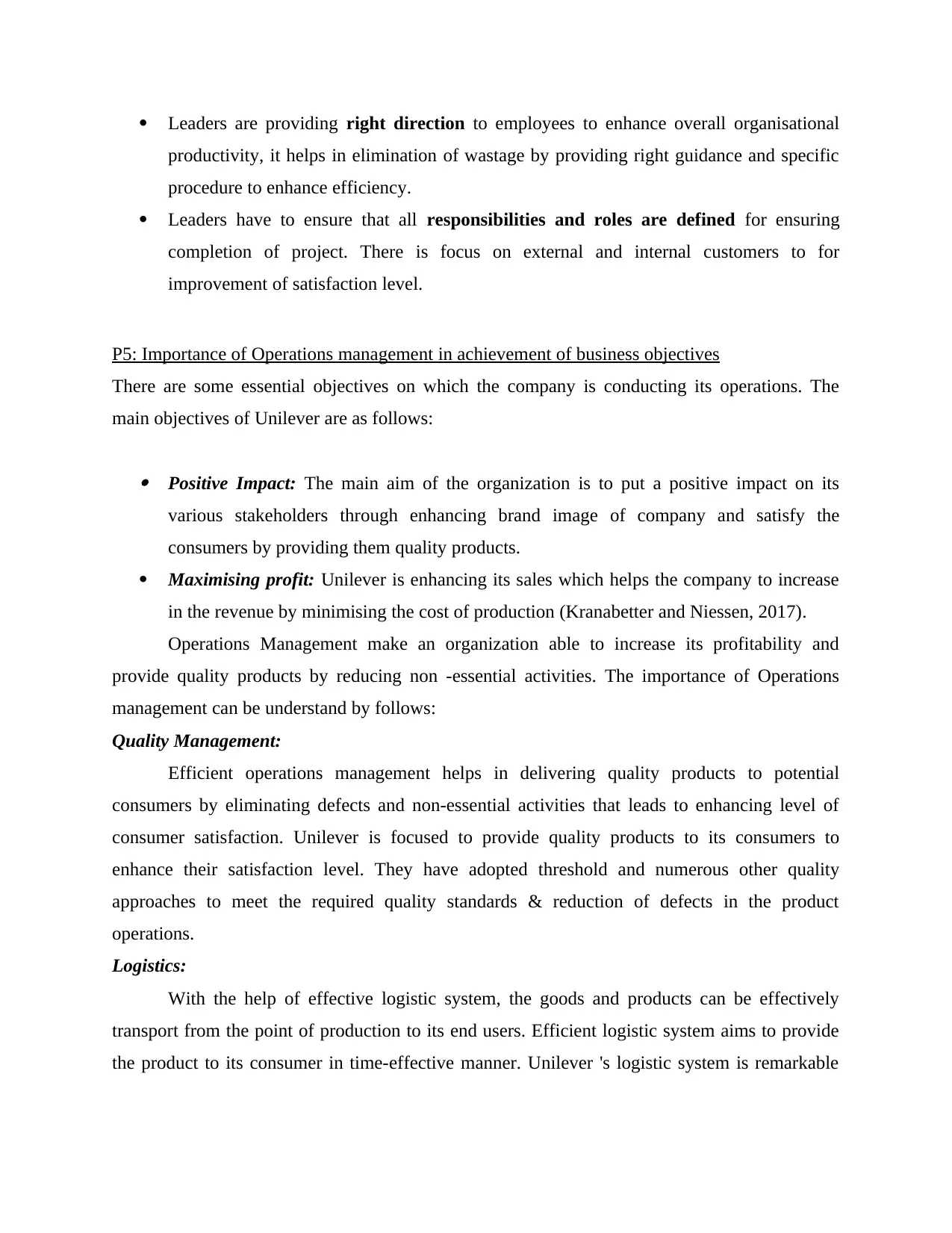
Leaders are providing right direction to employees to enhance overall organisational
productivity, it helps in elimination of wastage by providing right guidance and specific
procedure to enhance efficiency.
Leaders have to ensure that all responsibilities and roles are defined for ensuring
completion of project. There is focus on external and internal customers to for
improvement of satisfaction level.
P5: Importance of Operations management in achievement of business objectives
There are some essential objectives on which the company is conducting its operations. The
main objectives of Unilever are as follows:
Positive Impact: The main aim of the organization is to put a positive impact on its
various stakeholders through enhancing brand image of company and satisfy the
consumers by providing them quality products.
Maximising profit: Unilever is enhancing its sales which helps the company to increase
in the revenue by minimising the cost of production (Kranabetter and Niessen, 2017).
Operations Management make an organization able to increase its profitability and
provide quality products by reducing non -essential activities. The importance of Operations
management can be understand by follows:
Quality Management:
Efficient operations management helps in delivering quality products to potential
consumers by eliminating defects and non-essential activities that leads to enhancing level of
consumer satisfaction. Unilever is focused to provide quality products to its consumers to
enhance their satisfaction level. They have adopted threshold and numerous other quality
approaches to meet the required quality standards & reduction of defects in the product
operations.
Logistics:
With the help of effective logistic system, the goods and products can be effectively
transport from the point of production to its end users. Efficient logistic system aims to provide
the product to its consumer in time-effective manner. Unilever 's logistic system is remarkable
productivity, it helps in elimination of wastage by providing right guidance and specific
procedure to enhance efficiency.
Leaders have to ensure that all responsibilities and roles are defined for ensuring
completion of project. There is focus on external and internal customers to for
improvement of satisfaction level.
P5: Importance of Operations management in achievement of business objectives
There are some essential objectives on which the company is conducting its operations. The
main objectives of Unilever are as follows:
Positive Impact: The main aim of the organization is to put a positive impact on its
various stakeholders through enhancing brand image of company and satisfy the
consumers by providing them quality products.
Maximising profit: Unilever is enhancing its sales which helps the company to increase
in the revenue by minimising the cost of production (Kranabetter and Niessen, 2017).
Operations Management make an organization able to increase its profitability and
provide quality products by reducing non -essential activities. The importance of Operations
management can be understand by follows:
Quality Management:
Efficient operations management helps in delivering quality products to potential
consumers by eliminating defects and non-essential activities that leads to enhancing level of
consumer satisfaction. Unilever is focused to provide quality products to its consumers to
enhance their satisfaction level. They have adopted threshold and numerous other quality
approaches to meet the required quality standards & reduction of defects in the product
operations.
Logistics:
With the help of effective logistic system, the goods and products can be effectively
transport from the point of production to its end users. Efficient logistic system aims to provide
the product to its consumer in time-effective manner. Unilever 's logistic system is remarkable
Paraphrase This Document
Need a fresh take? Get an instant paraphrase of this document with our AI Paraphraser
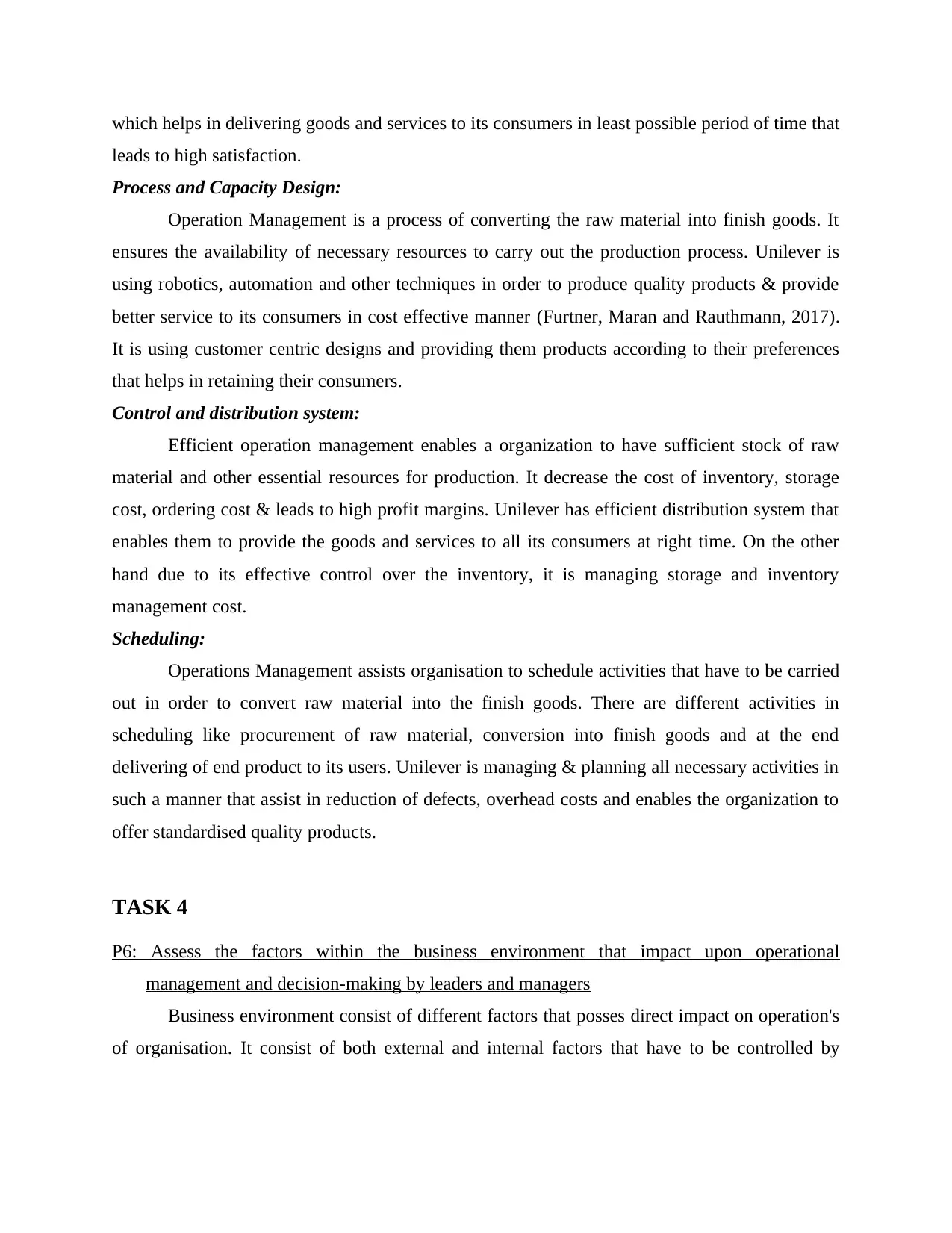
which helps in delivering goods and services to its consumers in least possible period of time that
leads to high satisfaction.
Process and Capacity Design:
Operation Management is a process of converting the raw material into finish goods. It
ensures the availability of necessary resources to carry out the production process. Unilever is
using robotics, automation and other techniques in order to produce quality products & provide
better service to its consumers in cost effective manner (Furtner, Maran and Rauthmann, 2017).
It is using customer centric designs and providing them products according to their preferences
that helps in retaining their consumers.
Control and distribution system:
Efficient operation management enables a organization to have sufficient stock of raw
material and other essential resources for production. It decrease the cost of inventory, storage
cost, ordering cost & leads to high profit margins. Unilever has efficient distribution system that
enables them to provide the goods and services to all its consumers at right time. On the other
hand due to its effective control over the inventory, it is managing storage and inventory
management cost.
Scheduling:
Operations Management assists organisation to schedule activities that have to be carried
out in order to convert raw material into the finish goods. There are different activities in
scheduling like procurement of raw material, conversion into finish goods and at the end
delivering of end product to its users. Unilever is managing & planning all necessary activities in
such a manner that assist in reduction of defects, overhead costs and enables the organization to
offer standardised quality products.
TASK 4
P6: Assess the factors within the business environment that impact upon operational
management and decision-making by leaders and managers
Business environment consist of different factors that posses direct impact on operation's
of organisation. It consist of both external and internal factors that have to be controlled by
leads to high satisfaction.
Process and Capacity Design:
Operation Management is a process of converting the raw material into finish goods. It
ensures the availability of necessary resources to carry out the production process. Unilever is
using robotics, automation and other techniques in order to produce quality products & provide
better service to its consumers in cost effective manner (Furtner, Maran and Rauthmann, 2017).
It is using customer centric designs and providing them products according to their preferences
that helps in retaining their consumers.
Control and distribution system:
Efficient operation management enables a organization to have sufficient stock of raw
material and other essential resources for production. It decrease the cost of inventory, storage
cost, ordering cost & leads to high profit margins. Unilever has efficient distribution system that
enables them to provide the goods and services to all its consumers at right time. On the other
hand due to its effective control over the inventory, it is managing storage and inventory
management cost.
Scheduling:
Operations Management assists organisation to schedule activities that have to be carried
out in order to convert raw material into the finish goods. There are different activities in
scheduling like procurement of raw material, conversion into finish goods and at the end
delivering of end product to its users. Unilever is managing & planning all necessary activities in
such a manner that assist in reduction of defects, overhead costs and enables the organization to
offer standardised quality products.
TASK 4
P6: Assess the factors within the business environment that impact upon operational
management and decision-making by leaders and managers
Business environment consist of different factors that posses direct impact on operation's
of organisation. It consist of both external and internal factors that have to be controlled by
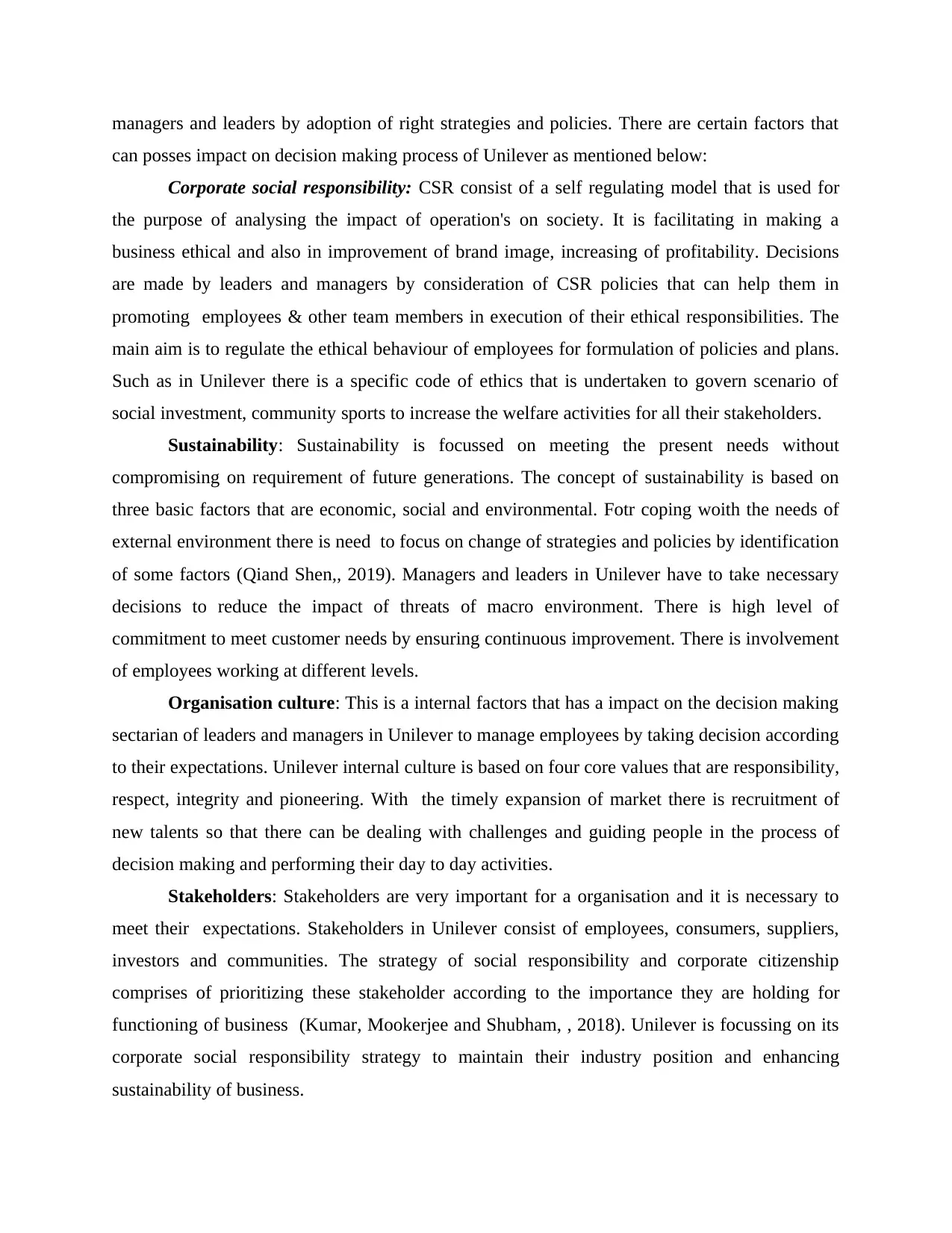
managers and leaders by adoption of right strategies and policies. There are certain factors that
can posses impact on decision making process of Unilever as mentioned below:
Corporate social responsibility: CSR consist of a self regulating model that is used for
the purpose of analysing the impact of operation's on society. It is facilitating in making a
business ethical and also in improvement of brand image, increasing of profitability. Decisions
are made by leaders and managers by consideration of CSR policies that can help them in
promoting employees & other team members in execution of their ethical responsibilities. The
main aim is to regulate the ethical behaviour of employees for formulation of policies and plans.
Such as in Unilever there is a specific code of ethics that is undertaken to govern scenario of
social investment, community sports to increase the welfare activities for all their stakeholders.
Sustainability: Sustainability is focussed on meeting the present needs without
compromising on requirement of future generations. The concept of sustainability is based on
three basic factors that are economic, social and environmental. Fotr coping woith the needs of
external environment there is need to focus on change of strategies and policies by identification
of some factors (Qiand Shen,, 2019). Managers and leaders in Unilever have to take necessary
decisions to reduce the impact of threats of macro environment. There is high level of
commitment to meet customer needs by ensuring continuous improvement. There is involvement
of employees working at different levels.
Organisation culture: This is a internal factors that has a impact on the decision making
sectarian of leaders and managers in Unilever to manage employees by taking decision according
to their expectations. Unilever internal culture is based on four core values that are responsibility,
respect, integrity and pioneering. With the timely expansion of market there is recruitment of
new talents so that there can be dealing with challenges and guiding people in the process of
decision making and performing their day to day activities.
Stakeholders: Stakeholders are very important for a organisation and it is necessary to
meet their expectations. Stakeholders in Unilever consist of employees, consumers, suppliers,
investors and communities. The strategy of social responsibility and corporate citizenship
comprises of prioritizing these stakeholder according to the importance they are holding for
functioning of business (Kumar, Mookerjee and Shubham, , 2018). Unilever is focussing on its
corporate social responsibility strategy to maintain their industry position and enhancing
sustainability of business.
can posses impact on decision making process of Unilever as mentioned below:
Corporate social responsibility: CSR consist of a self regulating model that is used for
the purpose of analysing the impact of operation's on society. It is facilitating in making a
business ethical and also in improvement of brand image, increasing of profitability. Decisions
are made by leaders and managers by consideration of CSR policies that can help them in
promoting employees & other team members in execution of their ethical responsibilities. The
main aim is to regulate the ethical behaviour of employees for formulation of policies and plans.
Such as in Unilever there is a specific code of ethics that is undertaken to govern scenario of
social investment, community sports to increase the welfare activities for all their stakeholders.
Sustainability: Sustainability is focussed on meeting the present needs without
compromising on requirement of future generations. The concept of sustainability is based on
three basic factors that are economic, social and environmental. Fotr coping woith the needs of
external environment there is need to focus on change of strategies and policies by identification
of some factors (Qiand Shen,, 2019). Managers and leaders in Unilever have to take necessary
decisions to reduce the impact of threats of macro environment. There is high level of
commitment to meet customer needs by ensuring continuous improvement. There is involvement
of employees working at different levels.
Organisation culture: This is a internal factors that has a impact on the decision making
sectarian of leaders and managers in Unilever to manage employees by taking decision according
to their expectations. Unilever internal culture is based on four core values that are responsibility,
respect, integrity and pioneering. With the timely expansion of market there is recruitment of
new talents so that there can be dealing with challenges and guiding people in the process of
decision making and performing their day to day activities.
Stakeholders: Stakeholders are very important for a organisation and it is necessary to
meet their expectations. Stakeholders in Unilever consist of employees, consumers, suppliers,
investors and communities. The strategy of social responsibility and corporate citizenship
comprises of prioritizing these stakeholder according to the importance they are holding for
functioning of business (Kumar, Mookerjee and Shubham, , 2018). Unilever is focussing on its
corporate social responsibility strategy to maintain their industry position and enhancing
sustainability of business.
⊘ This is a preview!⊘
Do you want full access?
Subscribe today to unlock all pages.

Trusted by 1+ million students worldwide
1 out of 15
Related Documents
Your All-in-One AI-Powered Toolkit for Academic Success.
+13062052269
info@desklib.com
Available 24*7 on WhatsApp / Email
![[object Object]](/_next/static/media/star-bottom.7253800d.svg)
Unlock your academic potential
Copyright © 2020–2026 A2Z Services. All Rights Reserved. Developed and managed by ZUCOL.





